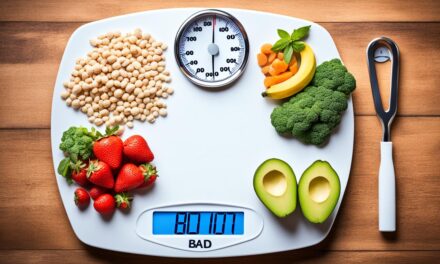Do you ever find yourself staring into the fridge, trying to resist that last slice of cake calling your name? Or promising yourself that you’ll start eating healthier, only to cave in to temptation moments later? It’s a common struggle, and the key to overcoming it might just surprise you.
Introducing the revolutionary “No Willpower” Diet – a game-changer for those looking to eat less without relying on sheer willpower. Instead of exhausting yourself by constantly fighting against your cravings, this diet offers clever strategies to trick yourself into eating less. By understanding the psychology of eating habits and implementing effective techniques, you can develop healthier habits and achieve your weight loss goals.
Picture this: You’re sitting at your favorite restaurant, trying to resist the enticing aroma of freshly baked bread. As you savor your small salad, you catch a glimpse of the delicious dessert tray passing by. Your willpower starts to waver, and you can feel yourself slipping. But instead of relying on sheer willpower to resist, you decide to try a different approach.
You pick up your phone and start scrolling through your favorite social media app. Before you know it, you’re engrossed in a funny video or an interesting article. Your attention is diverted away from the temptation, and suddenly, the dessert loses its grip on you. You’ve successfully tricked yourself into eating less, all without relying on willpower alone.
By incorporating distraction techniques like this into your daily life, you can overcome the challenges of sticking to a healthy eating plan. Whether it’s finding alternative pleasures, engaging in hobbies, or simply diverting your attention to something else, distraction can be a powerful tool in resisting temptations and developing healthier habits.
Key Takeaways:
- The “No Willpower” Diet offers strategies to trick yourself into eating less without relying on sheer willpower.
- Relying on willpower alone can be ineffective and exhausting in the long run.
- Distraction techniques can be more effective than willpower in resisting temptations.
- Developing healthy habits can increase the likelihood of long-term success.
- Use willpower to fuel your determination and motivation instead of relying on it to resist temptations.
The Problem with Willpower
When it comes to resisting food temptations, willpower is often seen as the ultimate weapon. But here’s the thing: relying on willpower alone can lead to failure. Why? Because willpower is like a muscle – it can get tired with continued use. So, when you’re faced with tempting foods, such as decadent desserts or mouthwatering snacks, towards the end of the day, your willpower may already be running on empty.
But fear not! The key to resisting temptation lies not in willpower, but in alternative strategies that tap into your self-control tactics. Let’s explore:
The Fallacy of Willpower
“Willpower is like a battery – it drains throughout the day, leaving you vulnerable to temptation when you need it most.”
Willpower is a mental force that can fatigue with continued use. It’s like trying to navigate a treacherous sea in a leaky boat – you’re bound to sink sooner or later. So, instead of relying solely on willpower to make healthier food choices, it’s time to explore other options.
Embrace Distraction, Avoidance, and Acceptance
“Distraction, avoidance, and acceptance are the secret weapons to conquer tempting food cravings.”
Instead of battling your cravings head-on, try distracting yourself from them. Engage in activities that capture your attention and divert your focus away from food. It could be reading a captivating book, solving a challenging puzzle, or even taking a brisk walk.
Avoidance is another powerful tactic. Keep tempting foods out of your sight and reach. Out of sight, out of mind, as they say. Make it easier for yourself to stay on track by creating an environment that supports your healthy eating habits.
Lastly, practice acceptance. Accept that cravings will come and go, but they don’t have to control your actions. Acknowledge your cravings, observe them without judgment, and allow them to pass. Remember, indulging in every craving won’t lead to long-term satisfaction.
The Art of Self-Control Tactics
“Reining in your temptations is a skillset you can develop and master with practice and determination.”
Understanding the limitations of willpower opens the door to implementing self-control tactics that actually work. It’s about being proactive rather than reactive. Here are a few strategies to consider:
- Plan your meals in advance, ensuring that they are nutritious and satisfying.
- Stock your pantry with healthy snacks and remove tempting treats.
- Practice mindful eating, savoring each bite and paying attention to your body’s hunger and fullness cues.
- Seek social support from like-minded individuals who share your commitment to healthy eating.
- Give yourself a break. Remember that slip-ups happen, and it’s essential to forgive yourself and get back on track.
By employing these alternative strategies and understanding the psychology behind willpower, you can unlock the power within you to make healthier food choices and achieve your goals.
The Power of Distraction
Distraction is the ultimate secret weapon when it comes to outsmarting your cravings and staying on track with your healthy eating goals. While willpower may eventually wear thin, distraction techniques have been proven to effectively delay gratification and resist temptation.
Remember the famous marshmallow experiment conducted by psychologist Walter Mischel? Distraction techniques, such as averting your gaze or engaging in alternative pleasures, were found to be far more successful in delaying gratification than relying solely on willpower. So, why not leverage the power of distraction to take control of your eating habits?
Picture this: You’re at a party, and there’s a tempting dessert table in front of you. Instead of mustering every ounce of willpower to resist, you distract yourself with an engaging conversation or an entertaining game. The key lies in diverting your attention away from the temptation, allowing your desires to fade into the background.
To harness the power of distraction, it’s important to find activities that captivate your mind and keep it occupied. Here are some mindful eating strategies that will help you embrace the art of diversion:
1. Read a Book
Escape into a gripping novel or immerse yourself in a thought-provoking non-fiction book. Reading not only transports you to another world but also keeps your mind engaged and away from unhealthy cravings.
2. Engage in a Puzzle
Challenge your brain with a crossword puzzle, sudoku, or a jigsaw puzzle. Focusing on solving a problem can divert your attention from food and help you break free from the grip of temptation.
3. Lose Yourself in a Movie
Indulge in a captivating movie or binge-watch your favorite TV series. The immersive experience will keep your mind off cravings and give you something else to revel in.
4. Dive into a Hobby
Whether it’s painting, gardening, knitting, or playing a musical instrument, engaging in a hobby can provide a fulfilling and distraction-filled escape from thoughts of food.
5. Spend Quality Time with Others
Connect with friends and loved ones by planning social activities that don’t revolve around food. Whether it’s taking a nature walk, going to a spa, or exploring a new museum, shared experiences and meaningful conversations can distract you from mindless eating.
Remember, distraction isn’t about depriving yourself; it’s about redirecting your attention to more fulfilling activities and ultimately regaining control over your eating habits.
By incorporating these distraction techniques into your daily life, you’ll find it easier to resist unhealthy temptations and focus on nourishing your body. Let your mind wander into the realms of hobbies, entertainment, and creativity, and watch as mindful eating becomes second nature to you.
Creating Healthy Habits
When it comes to maintaining a healthy diet, relying solely on willpower can be a constant battle. That’s where developing healthy habits comes in. Research suggests that making behaviors automatic through habit formation increases the likelihood of long-term success. So instead of relying on sheer willpower, why not make healthy eating a habit? Here are some behavior change techniques and self-control tactics to help you create healthy eating habits that stick.
Plan Your Meals in Advance
“By failing to prepare, you are preparing to fail.” – Benjamin Franklin
One of the most effective strategies for establishing healthy eating habits is planning your meals in advance. By taking the time to meal prep and create a weekly meal plan, you eliminate the guesswork and temptation of unhealthy options. Set aside a specific time each week to plan your meals and make a grocery list. This way, you’ll have all the ingredients on hand and reduce the chances of succumbing to unhealthy food choices.
Make Healthier Food Choices a Rule
“Success is the sum of small efforts, repeated day in and day out.” – Robert Collier
Instead of relying on willpower to make healthy food choices, make them a rule. Create guidelines for yourself, such as including a variety of fruits and vegetables in every meal, opting for lean protein sources, and limiting processed foods and sugary drinks. By making these healthier choices a habit, you’ll start to see positive changes in your body and mind.
Start Small and Gradually Incorporate Healthier Choices
“The journey of a thousand miles begins with a single step.” – Lao Tzu
Don’t overwhelm yourself by trying to completely overhaul your diet overnight. Instead, start small and gradually incorporate healthier choices into your daily routine. For example, swap out sugary snacks for fresh fruits, replace soda with sparkling water, or try experimenting with new recipes using nutritious ingredients. These small changes will add up over time and help you develop a sustainable, healthy eating pattern.
The “Creating Healthy Habits” Table
| Behavior Change Technique | Self-Control Tactic |
|---|---|
| Meal planning and preparation | Eliminate temptation and make healthier choices easily accessible |
| Setting guidelines for healthy eating | Make healthier food choices a rule |
| Starting small and gradually incorporating healthier choices | Reduce overwhelm and build sustainable habits |
Incorporating these self-control tactics and behavior change techniques into your daily routine can help you create healthy habits that last. Remember, it’s not about relying solely on willpower, but about making healthier choices a natural part of your life. By planning your meals in advance, making healthier food choices a rule, and starting small, you’ll be well on your way to achieving your goals and enjoying a balanced and nourishing diet.
Willpower and Determination
When it comes to achieving your weight loss goals, willpower can still be a valuable asset. However, instead of relying solely on willpower to resist temptations, it’s important to channel it towards creating determination and motivation. By shifting your focus from simply saying “no” to certain foods, you can use your willpower to fuel your commitment to making healthier choices.
Remind yourself of the reasons why you want to eat less and the benefits it will bring. Whether it’s to improve your overall health, enhance your self-confidence, or fit into those favorite jeans again, these reminders can serve as powerful motivators to keep you on track.
Now, let’s explore some weight loss tricks, self-control tactics, and behavior change techniques that can help you harness your willpower and overcome common challenges on your weight loss journey:
- Visualize success: Take a moment each day to visualize yourself achieving your weight loss goals. Imagine how proud and accomplished you will feel. This visualization exercise can help reinforce your determination and keep you motivated.
- Practice mindful eating: Pay attention to each bite you take, savoring the flavors and textures of your food. By eating mindfully, you can become more in tune with your body’s hunger and fullness cues, allowing you to make conscious choices and avoid overeating.
- Set realistic expectations: It’s important to set realistic goals and expectations for your weight loss journey. Remember, sustainable weight loss is a marathon, not a sprint. Embrace small victories along the way and celebrate your progress, no matter how small.
- Find a support system: Surround yourself with like-minded individuals who share your goals or join a weight loss support group. Having a supportive network can provide encouragement, accountability, and inspiration when your willpower wavers.
Remember, willpower is not a limitless resource. It’s okay to have moments of weakness or give in to cravings occasionally. The key is to bounce back quickly and refocus your determination. Stay committed to your goals, use your willpower wisely, and you’ll be amazed at what you can achieve on your weight loss journey.
Achieving Success: A Personal Story
“I used to rely solely on willpower to resist unhealthy foods, but it always felt like a constant battle. Once I shifted my focus to determination and used my willpower to fuel my commitment, everything changed. I started visualizing my success, practicing mindful eating, and surrounding myself with a supportive community. It wasn’t always easy, but my determination carried me through. Today, I’ve achieved my weight loss goals and developed lasting healthy habits. It’s not about depriving yourself; it’s about tapping into the power of your own self-control and staying motivated to make better choices.”
Tips for Harnessing Willpower
| Tip | Description |
|---|---|
| Visualize success | Imagine yourself achieving your weight loss goals, reinforcing your determination. |
| Practice mindful eating | Pay attention to your food, listen to your body’s cues, and make conscious choices. |
| Set realistic expectations | Set achievable goals and celebrate small victories along your weight loss journey. |
| Find a support system | Surround yourself with supportive individuals or join a weight loss support group. |
Conclusion
The “No Willpower” Diet offers a refreshing and effective approach to eating less without relying solely on sheer willpower. By acknowledging the limitations of willpower and employing behavior change techniques, you can trick yourself into eating less and achieve your weight loss goals.
Instead of depriving yourself or struggling with willpower, the key lies in finding alternative strategies that work for you. Implement distraction techniques, such as engaging in enjoyable activities or redirecting your focus, to divert your attention from tempting foods. Additionally, develop healthy habits by making small, sustainable changes to your eating routine and gradually incorporating healthier choices.
Remember, maintaining determination and motivation is crucial. Channel your willpower towards fueling your resolve to make healthier choices and stay committed to your goals. With the “No Willpower” Diet, you can make healthier eating a habit and enjoy the benefits of a balanced and nourishing diet.
FAQ
How does the “No Willpower” Diet work?
Why is relying solely on willpower ineffective?
How can distraction help with resisting temptation?
What role do healthy habits play in eating less?
How can willpower and determination work together?
MORE SOURCES TO READ:
- https://imaginemd.com/blog/an-alternative-to-willpower-for-losing-weight-distraction-avoidance-and-acceptance/
- https://ask.metafilter.com/312256/I-have-no-willpower-cant-stop-eating-junk-food
- https://alishapiro.com/4-weight-loss-willpower-myths-sabotaging-your-results-insatiable-season-8-episode-1/
![]()














Recent Comments